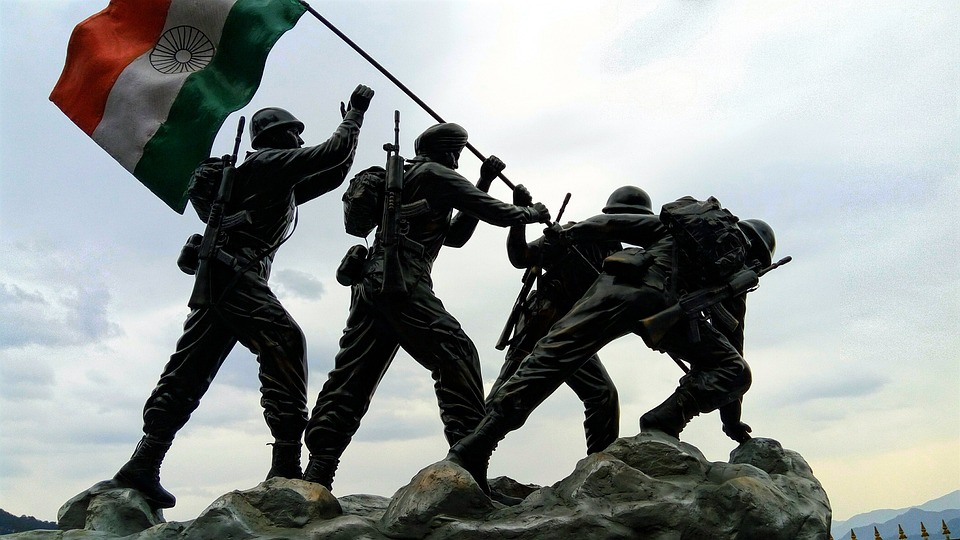Only white, thick, layer of ice wherever your eyes can see, freezing hurricanes of over 100 Km speed; this is the battlefield of Siachen which is situated on the height of 21000 feet, and which also is the highest battlefield in the world. Where there death is dressed as danger on every footstep. Border of China in the East & Pakistani border in the West. Snowflakes, landslides, metal bite, unheard diseases caused in high altitude areas and breathtaking, bone-freezing weather, how do our soldiers survive there?Our soldiers have two antagonists there. First is neighboring countries and second is adverse weather conditions. If a windy, snow-storm occurs and soldiers got struck, maybe even buried under the layers of snow; dogs of security force play a very important role in searching them. Generally there are 4 to 5 dogs in a squad of base camp. When a soldier is not found, is struck somewhere into storms, dogs are sent by helicopter with full safety after an immediate call. Wherever the soldier is trapped, dog claws or scratches the snow out. Which makes the inquiry easier and the soldier is saved.
Siachen, which is in the continuation of Nubra valley is also called as Junglee (wild) pink valley. But there's nothing except snow-coated mountains, not even the thorny bushes.
About over three decades ago, when the operation Meghdoot was held to reply Pakistan's Indian ceasefire violation; this no man's land spread on 70-75 Kms has turned into the battlefield. Both of India's enemies (Pakistan and China) have the route towards their CPEC (China-Pakistan Economic Corridor) going through india. Which is a greater risk and double danger for us. But, our military men, soldiers survive and fight against all odds even in such precarious, stormy weather conditions.
Soldiers on duty don't take bath for three to four months there (in Siachen). They only take towel parade. Where they only clean their body and after that, stay under the supervision all day. Just to keep away the diseases and to be healthy. They are notified and informed about when to change clothes and when to take towel parade. Hand-foot parade is conducted every single day in order to be safe from the cold. Where their feet are put in hot water to prevent any sort of cold injuries. Kerosene is lifeline there. Kerosene is used for lighting chimneys and heating the water/melting the ice. It also helps to keep the tent warm.
Before being posted on the battlefield of Siachen, soldiers go through a three week long tough training session. Mere after the strict training at the 12000 feet high Siachen Battle School (SBS) a soldier is sent even higher. Acclimatization is taught for a week. Soldiers are given training about the methods and tricks to survive and prevent lack of oxygen, low air pressure, minus temperature, low blood temperature, insomnia, memory loss, metal bite (if a person touches any iron-made thing in minus temperature, his fingers will stop working, maybe even moving. This is called metal-bite).
Protecting, handling and using the weapons in minus 40°, climbing vertical snow-walls, walking rope-up, sleeping on the bed of snow inside the sleeping bag in the tent, tips and tricks about how to be safe from the storms, and any kind of crisis are taught in the training. And lastly; they are sent on the border.
The CO of their unit sends them on the border check posts after completing training and they leave for the posting on the higher altitude. They walk towards checkposts and reach in about 10 days. Their whole lifestyle changes there. At 4:30 AM, when the sun rises, firstly they have to manage water for six to seven soldiers in the tent. Thirty to thirty-five Kg ice is brought and melted, which gives seventeen to eighteen liters of water. They mix anticeptic medicines in the water so that it becomes germ-free. Same water is used for drinking all day later. They also watch over tents, weapons and go out for patrolling.
Their life is on stake there. They are woken up every three hours because they might get out of breath. They don't feel hunger and appetite, but they must eat something to stay strong and protect the country, motherland and the natives. Salute to all the soldiers! We are safe here, because they're dying there.
❤❤❤❤❤
Source: Divya Marathi Solapur (दिव्य मराठी सोलापूर)
Source: Divya Marathi Solapur (दिव्य मराठी सोलापूर)


2 Comments
jai hind🚩
ReplyDeleteJai Bharat!❤
Delete